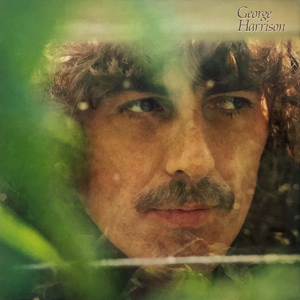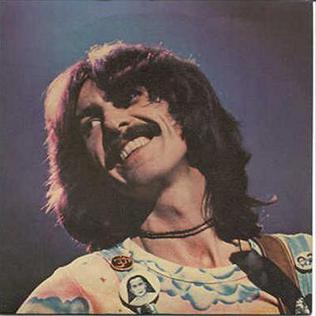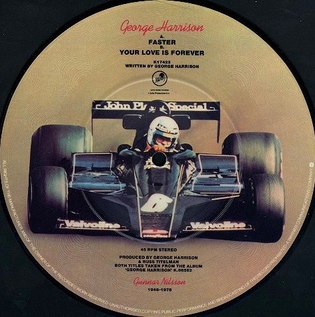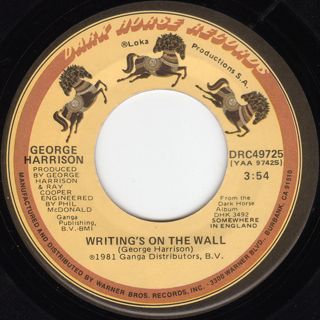
George Harrison is the eighth studio album by English rock musician George Harrison, released in February 1979. It was written and recorded through much of 1978, a period of domestic contentment for Harrison, during which he married Olivia Arias and became a father for the first time, to son Dhani. Harrison wrote several of the songs in Hawaii, while the track "Faster" reflected his year away from music-making, when he and Arias attended many of the races in the 1977 Formula 1 World Championship. The album also includes the hit single "Blow Away" and "Not Guilty", a song that Harrison originally recorded with the Beatles in 1968.

Thirty Three & ⅓ is the seventh studio album by English musician George Harrison, released in November 1976. It was Harrison's first album release on his Dark Horse record label, the worldwide distribution for which changed from A&M Records to Warner Bros. as a result of his late delivery of the album's master tapes. Among other misfortunes affecting its creation, Harrison suffered hepatitis midway through recording, and the copyright infringement suit regarding his 1970–71 hit song "My Sweet Lord" was decided in favour of the plaintiff, Bright Tunes Music. The album contains the US top 30 singles "This Song" – Harrison's satire on that lawsuit and the notion of plagiarism in pop music – and "Crackerbox Palace". Despite the problems associated with the album, many music critics recognised Thirty Three & ⅓ as a return to form for Harrison after his poorly received work during 1974–75, and considered it his strongest collection of songs since 1970's acclaimed All Things Must Pass.

The Best of George Harrison is a 1976 compilation album by English musician George Harrison, released following the expiration of his EMI-affiliated Apple Records contract. Uniquely among all of the four Beatles' solo releases, apart from posthumous compilations, it mixes a selection of the artist's songs recorded with the Beatles on one side, and later hits recorded under his own name on the other.

"You" is a song by English musician George Harrison, released as the opening track of his 1975 album Extra Texture . It was also the album's lead single, becoming a top 20 hit in America and reaching number 9 in Canada. A 45-second instrumental portion of the song, titled "A Bit More of You", appears on Extra Texture also, opening side two of the original LP format. Harrison wrote "You" in 1970 as a song for Ronnie Spector, formerly of the Ronettes, and wife of Harrison's All Things Must Pass co-producer Phil Spector. The composition reflects Harrison's admiration for 1960s American soul/R&B, particularly Motown.

"Love Comes to Everyone" is a song by English rock musician George Harrison from his 1979 album George Harrison. It is the opening track on the album and was also issued as the second single, after "Blow Away". The song reflects Harrison's contentment in his personal life as he was soon to become a father for the first time and married his second wife, Olivia Arias. Despite its commercial qualities, and contrary to some reviewers' predictions at the time of release, the song failed to become a hit.
"Sue Me, Sue You Blues" is a song written by English musician George Harrison, released on his 1973 album Living in the Material World. Harrison initially let American guitarist Jesse Ed Davis record it for the latter's Ululu album (1972), in gratitude to Davis for his participation in the Concert for Bangladesh. When writing the song, Harrison drew inspiration from the legal issues surrounding the Beatles during the early months of 1971, particularly the lawsuit that Paul McCartney initiated in an effort to dissolve the band's business partnership, Apple Corps.

"Teardrops" is a song by English rock musician George Harrison from his 1981 album Somewhere in England. It was also issued as the second single off the album, in July 1981. As with the lead single, "All Those Years Ago", Harrison completed the song after Warner Bros. Records had rejected his initial submission of Somewhere in England in September 1980. In response to Warner's concerns, he wrote "Teardrops" as an attempt at a commercially oriented song.

"Faster" is a song by English rock musician George Harrison from his self-titled 1979 studio album. The song was inspired by Harrison's year away from music-making in 1977, during which he travelled with the Formula 1 World Championship, and by his friendship with racing drivers such as Jackie Stewart and Niki Lauda. Although equally applicable to other professions, the lyrics address the difficulties of achieving and maintaining success in the field of motorsport, particularly Formula 1.

"Māya Love" is a song by English musician George Harrison, released on his 1974 album Dark Horse. The song originated as a slide guitar tune, to which Harrison later added lyrics relating to the illusory nature of love – maya being a Sanskrit term for "illusion", or "that which is not". Harrison's biographers consider the lyrical theme to be reflective of his failed marriage to Pattie Boyd, who left him for his friend Eric Clapton shortly before the words were written. Harrison recorded the song at his home, Friar Park, on the eve of his North American tour with Ravi Shankar, which took place in November and December 1974. The recording features Harrison's slide guitar extensively and contributions from four musicians who formed the nucleus of his tour band: Billy Preston, Tom Scott, Willie Weeks and Andy Newmark. Reviewers note the track as an example of its parent album's more diverse musical genres, namely funk and rhythm and blues, compared with the more traditional rock orientation of Harrison's earlier solo work.
"His Name Is Legs " is a song by English rock musician George Harrison, released in 1975 as the closing track of his album Extra Texture . The song is a tribute to "Legs" Larry Smith, the drummer with the 1960s satirical-comedy group the Bonzo Dog Doo-Dah Band and one of many comedians with whom Harrison began associating during the 1970s. Smith appears on the recording, delivering a spoken monologue, while Harrison's lyrics similarly reflect the comedian's penchant for zany wordplay. The song serves as a precursor to Harrison's work with Monty Python members Eric Idle and Michael Palin, including his production of the troupe's 1975 single "The Lumberjack Song" and films such as Life of Brian (1979) that he produced under the aegis of his company HandMade Films.

"Learning How to Love You" is a song by English musician George Harrison, released in 1976 as the closing track of his debut album on his Dark Horse record label, Thirty Three & 1/3. Harrison wrote the song for Herb Alpert, sometime singer and co-head of A&M Records, which at the time was the worldwide distributor for Dark Horse. Although the relationship with A&M soured due to Harrison's failure to deliver Thirty Three & 1/3 on schedule, resulting in litigation and a new distribution deal with Warner Bros. Records, Harrison still dedicated the song to Alpert in the album's liner notes.
"Here Comes the Moon" is a song by English rock musician George Harrison from his 1979 album George Harrison. Harrison wrote the song while on holiday on the Hawaiian island of Maui in February 1978. His inspiration for the composition was the appearance of the moon in the evening sky, just as the sun was setting. Although the lyrics focus on this natural occurrence rather than on the symbolism it suggests, in the manner of Harrison's Beatles track "Here Comes the Sun", the song is seen as a sequel to that similarly titled piece.

"Your Love Is Forever" is a song by English rock musician George Harrison from his 1979 album George Harrison. He wrote it as a guitar instrumental in an open tuning, before adding lyrics at the suggestion of his co-producer, Russ Titelman. The lyrics have an ambiguity typical of Harrison's work, in that the love he expresses is directed towards both a romantic partner and his God. In the United Kingdom, the song was also issued as the B-side of "Faster", on a charity single benefiting the cancer research project set up by the late Formula 1 driver Gunnar Nilsson.

"Soft Touch" is a song by English rock musician George Harrison from his 1979 album George Harrison. It was also issued as the B-side of the album's lead single, "Blow Away", in Britain and some other countries, while in markets such as North America, it was the B-side of the second single, "Love Comes to Everyone". Harrison wrote the song while in the Virgin Islands with his future wife, Olivia Arias, shortly before recording his 1976 album Thirty Three & ⅓. The song is a love song in which Harrison also conveys his wonder at the idyllic island setting.
"If You Believe" is a song by English musician George Harrison from his 1979 album George Harrison. Harrison began writing the song with Gary Wright on New Year's Day 1978 and finished the lyrics a month later while in Hawaii. The song appears as the final track on George Harrison. Its lyrics are a statement on the power of faith to bring about a desired outcome.

"Writing's on the Wall" is a song by English musician George Harrison from his 1981 album Somewhere in England. It was also the B-side of the album's lead single, "All Those Years Ago", which Harrison wrote as a tribute to his former Beatles bandmate John Lennon. In his lyrics, Harrison sings of the transient nature of life and the importance of recognising a spiritual purpose. Although the song was written long before Lennon's murder in New York in December 1980, the lyrics' reference to how easily friends can be shot down and killed led listeners to interpret it as a further comment on Lennon's death.

"Save the World" is a song by English rock musician George Harrison, released as the final track of his 1981 album Somewhere in England. It was also the B-side of "Teardrops", which was the second single off the album. An environmental protest song, "Save the World" was Harrison's first composition to directly address topical issues such as the nuclear arms race, rainforest and wildlife devastation, and the ecologically irresponsible practices of corporate concerns. Musically, the song partly recalls the style of the comedy troupe Monty Python.
"Life Itself" is a song by English musician George Harrison from his 1981 album Somewhere in England. Harrison also included it on his 1989 greatest-hits compilation Best of Dark Horse. As a love song to God, the track served as the artist's most overtly religious musical statement since 1974. The lyrics offer praise to Christ, Vishnu, Jehovah and Buddha, thereby marking a return to the concept of a universal deity, regardless of religious demarcation, that Harrison had first espoused in his 1970 hit single "My Sweet Lord".

Songs by George Harrison is a book of song lyrics and commentary by English musician George Harrison, with illustrations by New Zealand artist Keith West. It was published in February 1988, in a limited run of 2500 copies, by Genesis Publications, and included an EP of rare or previously unreleased Harrison recordings. Intended as a luxury item, each copy was hand-bound and boxed, and available only by direct order through Genesis in England. The book contains the lyrics to 60 Harrison compositions, the themes of which West represents visually with watercolour paintings. Starting in 1985, Harrison and West worked on the project for two years, during which Harrison returned to music-making with his album Cloud Nine, after focusing on film production for much of the early 1980s. The book includes a foreword by his Cloud Nine co-producer, Jeff Lynne, and a written contribution from Elton John.
Songs by George Harrison 2 is a book of song lyrics and commentary by English musician George Harrison, with illustrations by Keith West and an accompanying EP of previously unreleased Harrison recordings. It was published in June 1992, in a limited run of 2500 copies, by Genesis Publications. As with Harrison and West's first volume, published in 1988, each copy was hand-bound and available only by direct order through Genesis in England.
















